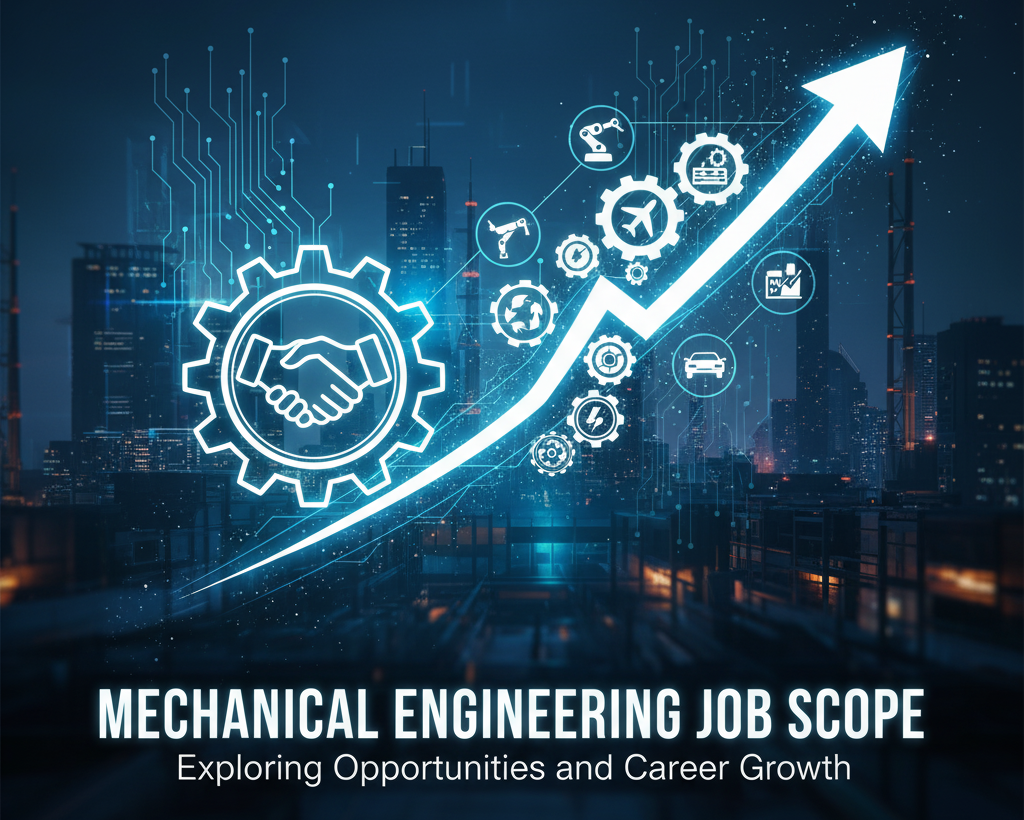
Have you ever given a thought as to why mechanical engineering is referred to as the “mother” of all engineering disciplines? From cars and planes to hospitals and renewable energy systems, the advancements of this field affect everything we do. At the heart of mechanical engineering is the design and production of machinery - machines we need to make our world work more efficiently.
This blog will discuss the mechanical engineering domain, job opportunities in various industrial applications, as well as futuristic trends for the mechanical engineering industry. Whether you’re at the stage of choosing your future or if you’re excited about your options around the world, you would like to find the ultimate guide to a mechanical engineering career.
The Core of Mechanical Engineering
Mechanical engineers are problem solvers, creators, and innovators. They design, analyse and maintain structures including engines and industrial equipment, vehicles such as cars and aeroplanes, and robots and energy systems.
Key Responsibilities of Mechanical Engineers:
- Product Design and Testing: Creating a prototype of a vehicle, machine or even a medical device.
- Streamline operations: Enhance efficiency in manufacturing systems, leading to higher productivity and less waste.
- Machine Building and Repair: Keeping machines, vehicles and equipment running smoothly and safely.
What makes the job unique is the variety of assignments. The mechanical engineering scope is transversal to many industries, and allows graduates to jump from one sector to another without any chains around their necks. A mechanical engineering career endows professionals with the required innovation, creativity, technical skills and problem-solving attitude that keep them relevant amidst the evolution of industries.
Diverse Industries and Job Roles
One of the best things about mechanical engineering jobs is the diversity that it entitles you to across all industries. Here’s an overview of some of the most promising sectors:
- Automotive: Automotive mechanical engineers are the creative minds at the heart of developing various components for the EVs, hybrids, and driverless cars of tomorrow. Job titles may be Design Engineer and Automotive Systems Analyst.
- Aerospace: From crafting propulsion systems for aeroplanes, spacecraft, and satellite components, aerospace is a fascinating field. Positions that a mechanical engineering graduate here could fill include Aerospace Engineer or Flight Systems Specialist.
- Manufacturing: This is the cornerstone of industrial expansion. Robotics, AI-driven automation, and lean manufacturing are among the various practices engineers focus on to enhance production lines. Titles include Process Engineer and Manufacturing Engineer.
- Energy: As demand for clean energy grows, mechanical engineers are creating wind turbines, solar panel systems and green building materials. Positions in this field include Energy Systems Engineer and Sustainability Consultant.
- Biomedical: In healthcare, engineers design prosthetics, surgical tools, and artificial organs. A part of a mechanical engineering job in this field can also involve research in biomechanics and the design of medical devices.
- HVAC (Heating, Ventilation, and Air Conditioning): Another emerging field of application is the climate control systems of sustainable buildings, particularly with a focus on energy efficiency.
Common Job Titles Offered After A Course Completion in Mechanical Engineering
- Design Engineer
- Manufacturing Engineer
- Robotics Engineer
- Project Manager
- Quality Assurance Engineer
This wide array of choices reflects the incredible mechanical engineering scope, making the field one of the most versatile and rewarding paths available.
Skills and Qualifications Most Valued in Mechanical Engineering
A good mix of technical skills, problem-solving and adaptability to a rapidly changing industry is what employers seek in mechanical engineers. Some of the most desirable characteristics and qualities are:
Technical Skills
- CAD and Simulation Tools: Experience with tools such as AutoCAD, SolidWorks and/or ANSYS.
- Programming: Python, MATLAB or C++ basic proficiency for automation and data analysis.
- Thermodynamics and Fluid Mechanics: Core mechanical concepts used across several industries.
- Robotics and Automation: Knowledge of Industry 4.0 tools and systems.
Soft Skills
- Analytical Thinking: The ability to think logically to solve complex technical problems.
- Creativity and Innovation: Designing or improving new systems.
- Project Management: Coordinating with teams and timelines effectively.
- Communication: Articulating technical concepts to non-technical stakeholders.
Qualifications
- Bachelor’s in Mechanical Engineering (B.Tech): The standard requirement for most entry-level positions.
- Master’s or PhD: For research-heavy or specialised fields such as aerospace or nanotechnology.
- Certifications: Project management (PMP), CAD software or quality assurance certifications give you a competitive advantage.
Developing these skills is crucial for success in the challenging marketplace for mechanical engineering jobs.
Salary and Career Growth
Mechanical engineer career salaries are relatively high, and there are excellent possibilities for advancement.
Entry-Level Salaries
Fresh graduates can earn between ₹3.5–6 LPA in India and earn between $60,000–75,000 per annum in the US.
Mid-Career and Senior Roles
With 5–10 years of experience, professionals can transition into roles such as project managers or consultants, commanding significantly higher salaries. Senior engineers and technical experts often earn six-figure salaries, particularly in sectors such as aerospace and energy.
Factors Affecting Pay
- Location: Engineers in large cities or international hubs tend to earn more money because demand is higher.
- Advanced Degrees: Those with a master’s or PhD in a particular field can see a significant salary increase.
- Specialised Skills: A background in CAD software, robotics, or automation will give you an edge with potential employers.
Overall, mechanical engineering job opportunities appear promising due to the growing role of technology and the need for innovation.
How Mechanical Engineers Can Stay Updated
Since industries evolve quickly, staying updated is essential to succeed in terms of a mechanical engineer career and remain relevant in the future of mechanical engineering. Here are some strategies:
- Continuous Learning: Enrol in online courses and certifications in robotics, AI, or sustainable technologies.
- Professional Associations: Consider joining groups like the American Society of Mechanical Engineers (ASME) for connections and potential job openings.
- Conferences and Workshops: Participate in industry events to gain insights into the latest tools and practices.
- Research Journals and Publications: Subscribe to major engineering journals for access to worldwide advances.
- Real-world experience: Work on real-world projects, internships, or with startups in the tech sector.
By actively updating their knowledge, mechanical engineers can remain at the forefront of innovation and maximise the growing mechanical engineering scope.
Additional Certifications and Training to Enhance a Mechanical Engineer’s Career
With a degree in mechanical engineering as a base, additional qualifications or specialisations can help one's employment outlook. They are best practices that not only showcase proficiency but also enable engineers to stay current in an industry that is rapidly growing and evolving. The following sections will cover the most beneficial certifications:
- Project Management Certifications: PMP (Project Management Professional) or PRINCE2-certified engineers can transition into leadership roles and manage large projects more effectively.
- Design and Simulation Tools: Certifications in CAD/CAE software, such as AutoCAD, CATIA, SolidWorks, and ANSYS, are extremely popular as they demonstrate a greater command over design and analytics.
- Lean Manufacturing & Six Sigma: Lean Six Sigma (Green Belt/Black Belt) courses provide engineers with skills for process optimisation and quality control, which are in demand in industry.
- Automation and Robotics Training: As industries adopt Industry 4.0 practices, training in robotics, PLC programming, and mechatronics helps engineers remain relevant in automation-driven environments.
- Data Analytics and AI Applications: As AI becomes an additional core to engineering, machine learning, Python, and MATLAB are certifications that mechanical engineers can enhance their ability to work at the intersection of engineering and digital technologies.
- Specialised Industry Certifications: Training in HVAC or renewable energy systems, as well as CFD (Computational Fluid Dynamics) certification, can all lead to niche roles in the energy, sustainability, and climate control sector.
By earning these certifications, mechanical engineers stretch their breadth of knowledge while demonstrating a capability to learn and adapt, attributes employers find valuable.
The Future of Mechanical Engineering
Emerging technologies are opening up entirely new prospects for the future of mechanical engineering.
Key Emerging Areas:
- Robotics and AI: Engineers are integrating AI for predictive maintenance and automated system design.
- Sustainable Technologies: Mechanical Engineering is at the forefront of advances in Renewable Energy, Green Buildings, and Environmentally-Friendly Transportation.
- 3D Printing (Additive Manufacturing): Transforming how prototypes and components are manufactured with speed and precision.
- Nanotechnology: Opportunities in advanced materials and medical applications at the molecular scale.
The future of mechanical engineering will continue to be defined by these advancements, ensuring it remains a forward-looking and dynamic career. This flexibility is the reason the mechanical engineering scope is large not only today, but is spreading into entirely new fields tomorrow.
Conclusion
Mechanical engineering is not just a job; it's a path to developing the future. From automobiles and jets to medical devices and renewable technologies, the work of mechanical engineers is integral to the evolution of modern society. A diversified mechanical engineer career provides an entry into many industries, offers strong salary potential, and is dynamic in the age of robotics, artificial intelligence (AI), and sustainable sciences. The world of mechanical engineering is in constant flux and undoubtedly one of the most hopeful career directions for decades to come.
If you have a strong interest in solving problems, innovating, and shaping the world of tomorrow, then a mechanical engineering career is the perfect fit for you.
FAQs


